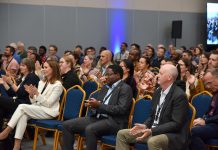By Sharon Atieno
Comprehensive sexuality education (CSE) is key to tackling sexual reproductive health (SRH) issues among adolescents, particularly early pregnancies, HIV and other sexually transmitted infections (STIs).
Dr. Anthony Ajayi, Research Scientist, African Population and Health Research Centre (APHRC) said during a Media for Environment, Science, Health and Agriculture (MESHA) café in Nairobi, Kenya’s capital.
Adolescents account for nearly thirty percent of sub-Saharan Africa (SSA)’s population. According to UNAIDS, every week, there were 3,100 new HIV infections among adolescents and young women aged 15 and 24 years in 2023 alone. In the SSA region, HIV prevalence among adolescent girls and young women is more than three times higher than among their male counterparts.
Worse still, the region has the highest teenage pregnancy prevalence rate in the world at 143 per 1,000 girls aged 15-19 years. Niger, Mali and Angola have the highest rates at 203,175 and 166 per 1,000 girls respectively.
Some statistics show that in 2021 alone, there were 6.1 million births among girls aged 15-19 years in the SSA region, with an additional 332,000 births among younger adolescents aged 10-14 years.
Underscoring the need to scale up age-appropriate, culturally sensitive, gender-responsive CSE in school and out of school, Dr. Ajayi noted that most of the SRH issues are being driven by inadequate or inaccurate sexuality education in the region.
“The majority of adolescents and youths are getting SRH information from peers or social media, most of which is not true,” he said, noting that taboos around discussing sexuality is leading to misinformation.
In the use of emergency contraception, for instance, Dr. Ajayi observed that young people, particularly women, are misinformed about emergency contraception (EC) and their reliance on unproven ECs constitutes a barrier to the use of approved EC methods.
This was based on his study titled “Use of non-emergency contraceptive pills and concoctions as emergency contraception among Nigerian University students.” The study found that many participants were misinformed about EC. Generally, participants relied on unconventional and unproven ECs such as Ampiclox, “Alabukun”, salt water solution, and lime and potash and perceived them to be effective in preventing unplanned pregnancies.
According to the United Nations Educational, Scientific and Cultural Organization (UNESCO), CSE is a curriculum-based process of teaching and learning about the cognitive, emotional, physical, and social aspects of sexuality. It aims to equip children and young people with knowledge, skills, attitudes, and values that will empower them to: realize their health, well-being, and dignity; develop respectful social and sexual relationships; consider how their choices affect their well-being and that of others; and understand and ensure the protection of their rights throughout their lives.
An APHRC report notes that sexuality education in SSA takes a biological approach. The focus tends to be on life skills and HIV and the frameworks tend to be fear-based or negatively discussed. The focus on gender and human rights is weak, and key topic areas such as contraceptive methods, sexuality, and abortion are avoided. Emerging societal issues are not addressed, and on desire, pleasure, sexual diversity, and contraception, programs are silent.
The report also highlights that significant barriers to CSE exist, including countries’ sociocultural norms and values as well as fidelity to the program, as teachers struggle to teach CSE as intended. “Misconceptions and deep-seated discomforts, biases, and objections about CSE have led teachers to struggle to teach sexual reproductive health rights [SRHR] and to a watering down of the curricula content,” the report says.
The report recommends community mobilization and sensitization for effective CSE adoption and implementation. “When parents and other community members are oriented on CSE, they learn to appreciate its benefits and will support its delivery. Bringing on board key influencers and opinion leaders (e.g., community leaders) can increase understanding of and support for CSE programs,” the report notes.







